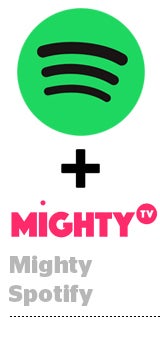Spotify revealed Monday it had acquired content recommendation engine MightyTV to further personalize its ad delivery capabilities. Read the release.
MightyTV founder and CEO Brian Adams will join Spotify as VP of technology. His eight employees will also join, and MightyTV will cease to exist as its own brand.
Spotify declined to share the terms of the deal.
Adams’ role is newly created, but it’s been open for some time, said Jason Richman, VP of product at Spotify. Spotify acqui-hired MightyTV’s team because of its technology as well as Adams’ history as founder and CTO of Admeld and as a product chief at Google.
“We’ve just been looking for a unicorn to fill [the role],” Richman said. “When it comes to attracting ad tech talent, there are few that have Brian’s pedigree.”
Adams launched MightyTV last April to help consumers consolidate movies and TV shows available on subscription video platforms like Netflix, HBO, Amazon and Hulu. The app offered a Tinder-like experience for users, who could swipe right (yay) or left (nay) until they found the movie or show they wanted to watch.
At Spotify, MightyTV’s technology will be applied to help the music streaming platform serve more relevant ads to users.
“It’s general-purpose tech,” Richman said. “Recommending traffic to the right user at the right time is the same technological problem as recommending the right marketing message.”
Spotify will integrate MightyTV’s recommendation engine with its proprietary data management platform, allowing Spotify’s ad products team to leverage listener data and other third-party assets to serve personalized ads to users programmatically.
Spotify has touted its personalization capabilities in the past, such as its ability to tailor ads to consumers based on the moments they experience on the platform in real time. But companies have to constantly innovate on personalization to stay competitive.
“It’s not a specific gap we’re looking to plug as much as accelerating what we can do in this space,” Richman said. “When it comes to personalized recs, you can never be too good.”
Spotify launched its programmatic audio offering last July. Richman declined to comment on how much Spotify is spending on developing programmatic audio capabilities but said it takes the “lion’s share” of investment.
“As far as where we’re spending our time and attention from an innovation perspective, it’s audio first,” he said. “We need to position ourselves such that audio is seen a first-class digital format so that when those dollars start to transition, we’re well positioned to capture them.”
Programmatic sales in general are “far and away our fastest growth channel,” Richman said, although he declined to provide numbers. Programmatic sales are led by display, and followed by video and audio.
“Audio is a nascent space that we’re developing, but it’s forming way quicker than expected,” he said. “It’s one thing to lay the pipes, but it’s another to build and generate demand in the marketplace.”
MightyTV will help Spotify understand when and where to push promotional messages for concerts, albums or artists based on listenership data. It will also help Spotify better market its own brand messaging to upsell users to its on-demand subscription product, Richman said.
“We see Spotify the marketer as the best first customer for everything we build on behalf of brands,” he said. “If we can super-serve our own needs, we’ll be well positioned to satisfy the needs of performance marketers in the future.”
The acquisition is also part of a broader push at Spotify to make its ad-supported product a premium experience for users rather than just an upsell.
“Stage one of our ads engineering mission was to keep free free, as it was a critical funnel to paid,” Richman said. “As of last year, we’ve doubled down on the [ad-supported] business in the hopes of establishing it as a standout standalone. This marks the latest investment in that area.”














